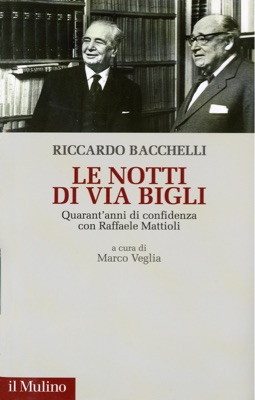
Le notti di via Bigli. Quarant’anni di confidenza con Raffaele Mattioli
Riccardo Baccheli, editor Marco Veglia
Bologna, Il Mulino, 2017
The volume reproduces the famous essay by Riccardo Bacchelli, one of the most prominent 20th-century Italian writers, in which he describes the salon of the celebrated ‘humanist banker’ Raffaele Mattioli: “Le Notti di via Bigli” was published privately in 1970 to mark the banker’s 75th birthday and was unavailable to buy; as well as the main text, the book also features other writings on Raffaele Mattioli by the same author. Completing the edition are biographies and a photo gallery of the personalities described by Bachelli.
The “friendly late-night gatherings” at Mattioli’s house in Via Bigli, Milan between the two wars were attended by leading figures of the day: intellectuals, politicians, writers, artists, bankers, philologists, professors and journalists. Describing the soirées that took place between the publication of his “Il Diavolo al Pontelungo” in 1927 and the bombing of Milan in August 1943 is writer Riccardo Bacchelli.
“Le notti di Via Bigli” is invaluable for the way it conjures up a crowd of unforgettable personalities: among them Antonello Gerbi, Giovanni Malagodi and Giorgio Di Veroli, engineer, bibliophile and devotee of the poetry of Torquato Tasso; Angelandrea Zottoli, government official and literary critic; Ugo La Malfa and Adolfo Tino, lawyer, “active and conspiring anti-Fascist”, later head of Mediobanca; the historian Federico Chabod; Nino Levi, Piero Sraffa; architects Giuseppe de Finetti and Gigiotti Zanini; scholars Francesco Flora and Sergio Solmi.
The anti-Fascism of the Via Bigli group, emphasised so extensively in literature, was not the ideological premise for the late-night meetings, but rather a consequence of the participants’ profound, enlightened culture, one in which economics, literature, finance, painting and politics helped weave together an “active faith” in the common good.
A cultural and civic insight is what emerges from the texts in the book, honouring Italian culture.